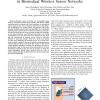Free Online Productivity Tools
i2Speak
i2Symbol
i2OCR
iTex2Img
iWeb2Print
iWeb2Shot
i2Type
iPdf2Split
iPdf2Merge
i2Bopomofo
i2Arabic
i2Style
i2Image
i2PDF
iLatex2Rtf
Sci2ools
APSCC
2008
IEEE
2008
IEEE
Algorithms for Transmission Power Control in Biomedical Wireless Sensor Networks
—Wireless sensor networks are increasingly being used for continuous monitoring of patients with chronic health conditions such as diabetes and heart problems. As biomedical sensor nodes become more wearable, their battery sizes diminish, necessitating very careful energy management. This paper proposes feedback-based closed-loop algorithms for dynamically adjusting radio transmit power in body-worn devices, and evaluates their performance in terms of energy savings and reliability as the data periodicity and feedback time-scales vary. Using experimental trace data from body worn devices, we first show that the performance of dynamic power control is adversely affected at long data periods. Next for a given data period we show that modifying the transmit power at too long timescales (around a minute) reduces the efficacy of dynamic power control, while too short a time-scale (few seconds or less) incurs a high feedback signaling overhead. We therefore advocate an intermediate range...
| Added | 29 May 2010 |
| Updated | 29 May 2010 |
| Type | Conference |
| Year | 2008 |
| Where | APSCC |
| Authors | Ashay Dhamdhere, Vijay Sivaraman, Vidit Mathur, Shuo Xiao |
Comments (0)

